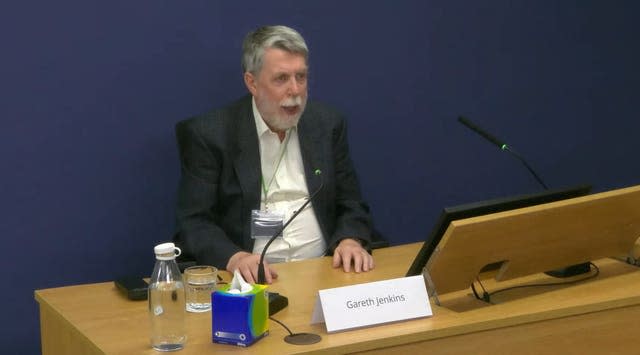Ex-Fujitsu engineer made ‘inappropriate’ edits to statement to help Post Office
A former senior Fujitsu engineer has admitted it was “inappropriate” for him to modify a draft witness statement to remove a reference to weaknesses in the Horizon system at the request of the Post Office.
A Post Office investigator had warned the company could be “embarrassed at court” if an acknowledgment of the software’s failures featured in the statement, which was requested in connection with allegations made against a subpostmaster in 2006.
Former Fujitsu engineer Gareth Jenkins also told the Post Office Horizon IT Inquiry he did not know the “gory details” of remote access to the faulty IT software which caused subpostmasters to be falsely accused of having taken money from branch accounts.

Mr Jenkins worked at Fujitsu, formerly known as International Computer Limited, for the whole of his professional career before retiring in 2015, and had been a “distinguished engineer” since the mid-1990s.
His evidence about the Horizon system was used in the prosecutions of many subpostmasters, including Seema Misra, who was given a 15-month prison sentence in November 2010, when she was eight weeks pregnant.
Previous witnesses to the inquiry have claimed Mr Jenkins may have committed perjury due to his failure to disclose knowledge of bugs in the Horizon system to the subpostmasters.
He is currently the subject of a Metropolitan Police investigation on suspicion of perjury and perverting the course of justice.
Mr Jenkins told the inquiry on Wednesday that he did not “see it as inappropriate at that time” to amend the witness statement he was asked to provide concerning allegations against subpostmaster Noel Thomas, who was jailed for false accounting in 2006.
A revised draft of the statement provided by Post Office investigator Graham Ward crossed out a line which offered an explanation for erroneous transactions that could cause shortfalls in branch accounts.
It read: “There has been some sort of System Failure. Such failures are normal occurrences.”
Mr Ward added a note on the document, describing the explanation as a “really poor choice of words which seems to accept that failures in the system are normal and therefore may well support the postmasters claim that the system is to blame for the losses !!!!”.

He had warned in an earlier email to another Fujitsu employee that the line “is potentially very damaging” and should be removed to “ensure we are not embarrassed at court”.
“Did you see it as appropriate to haggle with the prosecutor over the content of your witness statement?” Mr Beer asked.
Mr Jenkins replied: “I didn’t see it as inappropriate at the time, but I clearly see now that it was.”
But he insisted the changes meant he was “still accurately reflecting what had happened but using less emotive words”.
The statement was not ultimately heard in court as Mr Thomas pleaded guilty.
The former engineer also told the inquiry he thought any remote access would have been visible to subpostmasters and could be distinguished from changes made by third parties, although he acknowledged he knew it was “theoretically possible” this might not always be the case.
Pressed by Mr Beer as to how he had formed this view, Mr Jenkins said it had emerged from “informal conversations” with staff at Fujitsu’s software support centre (SSC).
He said he accepted Mr Beer’s suggestion that “SSC staff could not only effectively hijack branch user IDs in this way to insert transactions into branch accounts, but did so”.
The inquiry was shown a witness statement from Second Sight forensic accountant Ian Henderson in which he alleged Mr Jenkins had told him in 2012 that Fujitsu “routinely used remote access to branch terminals” without subpostmasters’ knowledge or “explicit” consent.
This included generating “keystrokes that were indistinguishable from a subpostmaster accessing the terminal directly”.
Mr Jenkins said he did not “think I would have said that” but added that the general details of remote access were accurate.
He said it was correct “that there was remote access, yes, but not in terms of the gory details”.
He added that he thought Fujitsu would “have been using that facility responsibly and doing it when they needed to correct errors that had occurred in the branches”.
Have you been affected by the Post Office Horizon scandal? You can share your story now at #InYourOwnWords, our listening project for people impacted by the scandal 📢 https://t.co/WS7AtB2Y1j pic.twitter.com/Vj7j3COtTt
— Post Office Horizon IT Inquiry (@PostOffInquiry) June 24, 2024
On Tuesday, Mr Jenkins told the inquiry he did not recall receiving a letter from law firm Bond Pearce sent to Fujitsu in 2005 laying out the duties of an expert witness and said he would “have done things differently” in later cases – including that of Ms Misra – if he had.
But the inquiry was shown the original version of an email sent to Mr Jenkins the following year which contained the letter as an attachment.
It concerned a request for his expert testimony in the case of Lee Castleton, who was made bankrupt after he lost his legal battle with the Post Office. Mr Jenkins was later told he would not need to give evidence.
Mr Beer said the email proved he had received the letter, asking the engineer: “Do you remain of the view, that you expressed yesterday, that, if the letter had been sent to you, you would have read all of it and not just half of it?”
Mr Jenkins replied: “I would probably have skimmed through it but clearly it hadn’t stuck in my mind beyond the time… so, yes, I probably would have opened it up and read it but I have no recollection of doing that.”
He added: “I probably would have read all of it but I probably didn’t read it in detail and obviously it didn’t stick in my mind and I’m sorry if I misled you yesterday to suggest that it would have stuck.”
Speaking after the hearing, Ms Misra again described Fujitsu and the Post Office’s behaviour as “like a mafia”.
Of Mr Jenkins’ testimony, she told the PA news agency: “It doesn’t make sense. The evidence doesn’t tally. It doesn’t tally at all.”

She added she was “not sure” why some witnesses had been so reluctant to admit flaws in the Horizon system, saying: “It could be the consequences they’re worried about, or their ego, or a cover-up.”
“They’re like a mafia, they can do whatever they want to do. They think they can get away with anything, which is bad.
“That’s why we need full accountability.”
The inquiry also heard that Mr Jenkins had requested the deletion of two paragraphs included in his draft witness statement concerning the allegations against subpostmaster Mr Thomas which claimed that “at all material times the computer was operating properly”.
In his witness statement to the inquiry, Mr Jenkins said he believed it related to the desktop he had used to write the witness statement and not the Horizon system, as Mr Beer suggested.
More than 700 subpostmasters were handed criminal convictions between 1999 and 2015 when errors in the Post Office’s Horizon IT system meant money appeared to be missing from many branch accounts when, in fact, it was not.
It has been branded the biggest miscarriage of justice in British legal history.
Mr Jenkins is due to give evidence for four consecutive days up to Friday, the longest run of questions any witness has faced so far.
The inquiry continues.


